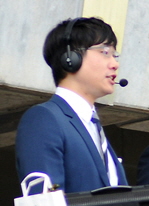| Kim Jin-seong | |
| Hangul | 김진성 |
|---|---|
| Revised Romanization | Kim Jin-seong |
| McCune–Reischauer | Kim Chin-sŏng |
Kim Jin-seong,or Kim Jin-sung a Korean name consisting of the family name Kim and the masculine given name Jin-seong,may refer to:
| Kim Jin-seong | |
| Hangul | 김진성 |
|---|---|
| Revised Romanization | Kim Jin-seong |
| McCune–Reischauer | Kim Chin-sŏng |
Kim Jin-seong,or Kim Jin-sung a Korean name consisting of the family name Kim and the masculine given name Jin-seong,may refer to:
Seong (Korean: 성), also spelled Song or Sung, is an uncommon Korean family name, a single-syllable Korean given name, as well as a common element in two-syllable Korean given names. The meaning differs based on the hanja used to write it.
Inchon Kim Seong-su (1891–1955) was a South Korean educator, journalist and politician.
Kim Sung-hwan (김성환), a.k.a. Kim Seong-hwan, Kim Sǒng-hwan may refer to:

Park Sung-woong is a South Korean actor. Following his acting debut in No. 3 in 1997, Park has starred in several movies and television series, notably as a gangster in New World (2013) and a serial killer in The Deal (2015).

Kim Sung-oh is a South Korean actor. He is best known for his supporting roles in the television series Secret Garden and the film The Man from Nowhere.
Kim Seong-min is the common English spelling of a Korean name also spelled Kim Sung-min. It may refer to:
Sung-min, also spelled Seong-min, is a Korean unisex given name. Its meaning differs based on the hanja used to write each syllable of the name. There are 27 hanja with the reading "sung" and 27 hanja with the reading "min" on the South Korean government's official list of hanja which may be registered for use in given names. Sung-min was the eighth-most popular name for baby boys in South Korea in 1970, rising to second place in 1980, where it remained in 1990.
Sung-ho, also spelled Seong-ho, is a Korean masculine given name. The meaning differs based on the hanja used to write each syllable of the name. There are 27 hanja with the reading "sung" and 49 hanja with the reading "ho" on the South Korean government's official list of hanja which may be used in given names. It was the sixth-most popular name for baby boys in South Korea in 1950, rising to first place in 1960, but was displaced from the top spot in 1970 by Ji-hoon.
Ho-sung, also spelled Ho-seong, is a Korean masculine given name. The meaning differs based on the hanja used to write each syllable of the name. There are 49 hanja with the reading "ho" and 27 hanja with the reading "sung" on the South Korean government's official list of hanja which may be used in given names.
Sung-soo, also spelled as Seong-soo, Seong-su, or in North Korea as Song-su, is a Korean masculine given name. The meaning differs based on the hanja used to write each syllable of the name. There are 27 hanja with the reading "sung" and 67 hanja with the reading "soo" on the South Korean government's official list of hanja which may be used in given names. It was the third-most popular name for baby boys in South Korea in 1950, falling to seventh place in 1960.
Sung-jin, also spelled Seong-jin or Song-jin, is a Korean masculine given name. Its meaning depends on the hanja used to write each syllable of the name. There are 27 hanja with the reading "sung" and 48 hanja with the reading "jin" on the South Korean government's official list of hanja which may be used in given names.
Tae-seong, also spelled Tae-sung or Thae-song, is a Korean masculine given name. Its meaning differs based on the hanja used to write each syllable of the name. There are 20 hanja with the reading "tae" and 27 hanja with the reading "seong" on the South Korean government's official list of hanja which may be registered for use in given names.

Kim Sung-ryung is a South Korean actress and beauty pageant titleholder. She won Miss Korea 1988 later represented her country at Miss Universe 1989 pageant, Kim began her career as a reporter on KBS's showbiz news program Entertainment Weekly. In 1991, she made a memorable film acting debut in Kang Woo-suk's Who Saw the Dragon's Claws?, though she became more active in television in the next decade. She returned to the big screen in 2007, with notable supporting roles in Shadows in the Palace, and Rainbow Eyes, followed by The Client (2011), Mr. XXX-Kisser (2012), The Fatal Encounter (2014), and The Target (2014). As she entered her forties, Kim also became known for the television dramas You're Beautiful (2009), The Chaser (2012), Yawang (2013), The Heirs (2013), and Flower of Queen (2015).
Jin-sung, also spelled Jin-seong, is a Korean unisex given name. The meaning differs based on the hanja used to write each syllable of the name. There are 48 hanja with the reading "jin" and 27 hanja with the reading "sung" and on the South Korean government's official list of hanja which may be used in given names.

Kim Sung-joo is a South Korean television host and a former announcer. A former sports broadcaster and presenter, he became known to the wider public as a variety show host and for his stint on the reality-variety show Dad! Where Are We Going?.
Kim Sung-joo or similar may refer to:
Dae-sung, also spelled Dae-seong, is a Korean masculine given name. Its meaning differs based on the hanja used to write each syllable of the name. There are 17 hanja with the reading "dae" and 27 hanja with the reading "sung" on the South Korean government's official list of hanja which may be registered for use in given names.

Bae Sung-jae is a South Korean television personality, sportscaster, radio DJ and announcer.
Kim Tae-seong or Kim Tae-sung (김태성) may refer to:
Gim Jinseong (Korean: 김진성) may refer to: